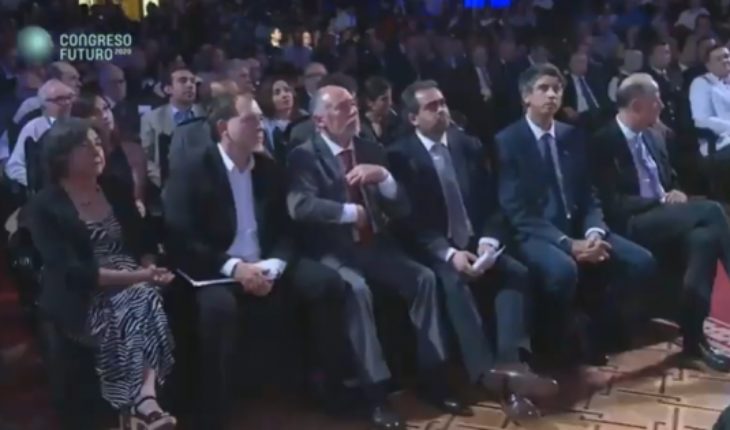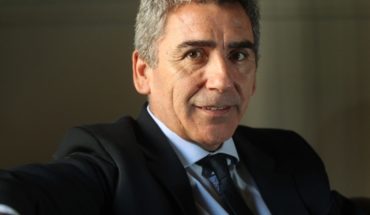The Future Congress was officially opened on Monday afternoon at the former National Congress, with the participation of various authorities, academics and scientists, although without the assistance of President Sebastian Piñera.
Last year, the representative himself had been part of the inauguration, where he noted that it was “a tremendous opportunity and a great source of inspiration and satisfaction, and it is a real privilege to be able to transform Chile, if only for a few days, into a true capital of knowledge, research and wisdom.”
In the midst of 10% approval according to Cadem’s latest survey, Piñera was not included in the program. His figure had also been harshly questioned by guests to Congress who decided to cancel his participation, such as the philosopher Franco Berardi, in protest at the violation of human rights exercised by the Government after the social outburst.
“Because it doesn’t comply with the ads, it will have fewer unfulfilled ads,” said Jorge Babul, an academic at the University of Chile and former president of the Council of Scientific Societies. “Perhaps it is no longer new to the inauguration of Congress and do not believe that knowing more will help the development of ours and the country.”
Science and politics meeting place
On this occasion the event was headed by the holders of the Senate and the Chamber of Deputies, Jaime Quintana and Iván Flores, respectively, where Lucía López and Paloma Avila acted as presenters.
Senator Guido Girardi, the main promoter of the event, the president of the Academy of Sciences, Cecilia Hidalgo, Andrés Couve, Minister of Science, Daniel Fernández, president of the Encuentros del Futuro Foundation, and Frances Arnold, Premio Nobel Prize in Chemistry and one of the main guests.
Quintana highlighted the Future Congress as a meeting place between science, academia and citizens, to discuss issues such as climate change and gender issues, where she alluded to the Conference on Monday by Nigerian Chimamanda Ngozi.
“Are we prepared to receive intelligent life in the future?” was another question that was raised, in a world of “horizontality, much more complex to govern,” in a “change of epoch” where the path “is dialogue” and not repression, he said, in addition to call for the care of the environment and claim the New Constitution, in addition to investment in science and technology.
Flores, for its part, highlighted the Future Congress as a place to understand “our realities” and a place of union “between science and politics”, where “technological advances” are the engine of development.
At the same time, he said, “Chile is being challenged by a social movement,” where despite successful indexes, “we were not able to correct abuses,” he acknowledged.
He also warned that ethics must ensure that science respects the fundamental rights of human beings, including in the field of artificial intelligence.
“In Chile we didn’t know how to listen to Chile, and at Cop25 we weren’t able to listen to the world,” he lamented.
Girardi, meanwhile, emphasized that guests come “free” and their talks are available to the public. He reminded Juan Asenjo, as president of the Academy of Sciences, in the genesis of the event, and emphasized that in “difficult times” it is organized by a wide political range of senators, ranging from the UDI to the PS.
“What is happening in Chile is happening in many corners of the planet,” he stressed, to rescue the need for reflection on issues such as climate change, along with warning that inequality puts democracy at risk, not only in our country, but in the world, where together with a “social collapse” there is an “ecological collapse.”
“Human beings have reached a higher place, but those same technologies that have taken us there are the main threats,” he warned, posing a challenge to politics, whose institutions are also becoming obsolete.
“We are on the brink of a collapse,” where neither left nor right are in response to the challenges of the 21st century, and more and more algorithms determine what to buy or vote and there are no alternatives to Google or Facebook, with cyberspace as a “new territory” gone privatizing more and more.
Terrifying speed
The president of the Academy of Sciences, for her part, acknowledged that the world is “changing at an almost terrifying rate, and raises a lot of questions.”
He also highlighted the presence of two Nobel laureates and women, and said Chile “needs more science” to achieve development, especially through social outburst and “the need for profound transformations.”
“Only science has the virtue of understanding the world to transform it,” he said, so rs needto increase investment in it.
This in order to include in society all Chileans, and to be able to face crises such as climate change, which linked to water scarcity in Chile, which in turn poses challenges such as creating plants resistant to lack of water and ensuring food.
“It is urgent to increase the number of scientists” in all areas, he said, not only to generate publications but to improve living conditions in society, and for which it is necessary to achieve their insertion in decent conditions, without displacing those already in force, in areas such as genomics or astronomy.
Couve, for its part, also stressed that science is key to achieving development and improving people’s quality of life, but acknowledged that there are multiple actors, scenarios and situations.
He stressed the need to strengthen democracy, along with the importance of linking academia, science, governments and society, one of the axes of the Ministry of Science being launched, with initiatives such as the National Science Policy. He also highlighted the ministry’s official initiative on gender issues and the social crisis.
“The impact of our science will be determined by the quality of our scientists,” he said, so it is key to train professionals of excellence, where knowledge is at the heart of “our development.” “That’s the key to our future.”
Nobel Talk
The day was closed by Arnold, the Nobel Prize in Chemistry, who thanked him for the invitation to the event. The scientist began her exhibition by mentioning her participation in the television series “Big Bang Theory”, where she played herself.
Arnold stressed the importance of scientists in tackling the challenges of the future, alongwith politicians and artists.
He then recounted his work at the time of DNA research and his eagerness to do work that was useful in daily life. He also mentioned the evolution and lesson he provides in the sense of adaptation as a key to ensuring survival.
Good way
The event runs from Monday to Thursday at the Oriente Theatre in Providencia, and its main objective is “to be a space for reflection to help this social process in search of equity go the right way,” Senator Guido Girardi said on Monday. , the main driver of the event.
The situation for the October 18 outbreak forced the change of the venue and shorten its participation, although it achieved remarkable gender parity: 47% of women by 53% of men.
Earlier this Monday, Senator Girardi, chairman of the Challenges of the Future Commission – a body that, in conjunction with the Academy of Science, universities, the House and other government entities – drives the scientific outreach event more important of the southern hemisphere, he noted that The Future Congress “is a space for reflection on the borders of changes that occur in Chile but are global.”
He added: “We must make this process that seeks equality and fairness, it is on the right track. The Arab Spring in Egypt toppled one dictatorship, but fell into a worse one. We want Chile to move to be a better, more democratic, more inclusive country.”
The senator stressed that to Congress Future 2020 “we invite the brightest minds on the planet, Nobel laureates, intellectuals like Chimamanda, which is the expression of egalitarian feminism, but at the same time there are experts in artificial intelligence who alert us which can be a great contribution, as well as making representative democracy irrelevant, because it renders laws obsolete before it is enacted.”





